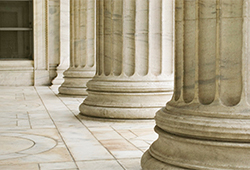 With the growing volume of biosimilar and pharma litigation in district courts and before the PTAB, the U.S. International Trade Commission may emerge as another forum for patent holders against imported biosimilars. Section 337 of the Tariff Act of 1930 allows patent holders with a domestic industry relating to the patented products to bring an action before the ITC to exclude imported infringing products. In recent years, the number of Section 337 complaints filed against pharmaceuticals and medical devices has significantly increased.
With the growing volume of biosimilar and pharma litigation in district courts and before the PTAB, the U.S. International Trade Commission may emerge as another forum for patent holders against imported biosimilars. Section 337 of the Tariff Act of 1930 allows patent holders with a domestic industry relating to the patented products to bring an action before the ITC to exclude imported infringing products. In recent years, the number of Section 337 complaints filed against pharmaceuticals and medical devices has significantly increased.
While Section 337 infringement litigations involve similar issues as district court litigations, they are much faster: typically reaching a final decision within about 18 months of filing of the complaint. There are also unique substantive and procedural differences. Unlike many district courts, the ITC, has not stayed actions in view of pending IPRs. Section 337 actions are also “in rem,” and personal jurisdiction is unnecessary. There is also the frequently discussed “domestic industry” requirement. In 2016 the Commission found violations in 69% of the cases and in 2015 the Commission found violations in 64% of the cases.
Although no Section 337 action, to date, has alleged infringement of a biosimilar product, the ITC is no stranger to litigation involving biologics (along with other pharmaceuticals and medical devices). See, for example, In re Certain Recombinant Factor VIII Products, Inv. No. 337-TA-956; In re Certain Antivenom Compositions, 337-TA-903; In re Certain Products and Pharmaceutical Compositions Containing Recombinant Human Erythropoietin, Inv. No. 337-TA-568; and Certain Hemostatic Products and Components Thereof, Inv. No. 337-TA-913. As more biosimilars approach approval of their aBLAs, Section 337 could become a tool for branded biologics seeking to maintain exclusivity, and an obstacle for imported biosimilars.
To learn more about litigation at the ITC, request a copy of Litigating Section 337 Cases: Understanding the International Trade Commission here.

